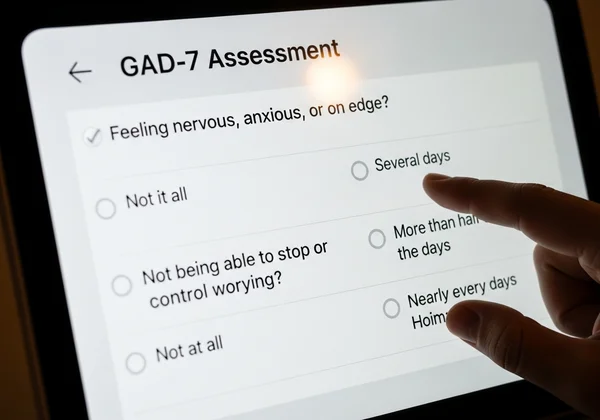Supporting Loved Ones with Anxiety: How the GAD-7 Assessment Can Help
October 8, 2025 | By Fiona Hayes
Watching a loved one struggle with anxiety can feel isolating and heartbreaking. You want to offer support, but it's often hard to know what to say or do without making things worse. You might be wondering, what are the best ways to help someone with anxiety? This comprehensive guide provides practical, empathetic advice, empowering you as a friend or family member to be a true source of strength and understanding. Effective support starts with knowledge – understanding anxiety's signs is your crucial first step.

Understanding Anxiety Symptoms & The Role of GAD-7 for Clarity
Before you can offer effective support, it’s crucial to recognize what your loved one is experiencing. Anxiety isn't just "worrying too much"; it's a complex condition that manifests in various ways. By understanding its impact, you can approach the situation with greater empathy and patience, which is fundamental to providing meaningful help.
Recognizing Common Anxiety Symptoms
Anxiety can show up physically, emotionally, and behaviorally. Your friend or family member might not experience all these signs, but recognizing a pattern can be the first step in understanding their struggle. Pay attention to changes in their usual demeanor.
Common signs include persistent worry that is difficult to control, feeling restless or on-edge, and becoming easily fatigued. You might also notice irritability, muscle tension, or significant trouble with sleep, either falling asleep or staying asleep. In social situations, they might seem withdrawn or avoid gatherings they once enjoyed. These symptoms can make daily tasks feel overwhelming and create a cycle of avoidance and fear.
How the Effects of Anxiety Impact Daily Life
Anxiety isn't isolated; its threads often weave through every aspect of daily life, affecting work, relationships, and self-esteem. A loved one might struggle to meet deadlines at work or school because of concentration difficulties or the fear of not performing perfectly. This can create a cycle of stress and self-criticism.
Relationships can also become strained. Your loved one might cancel plans at the last minute or seem distant, not because they don't care, but because the energy required to socialize feels insurmountable. Understanding this isn't personal is key. Their world may have shrunk as they try to manage overwhelming feelings, and your role is to offer a safe, non-judgmental presence within that space.
Communicating Effectively and What to Say to Someone with Anxiety
The right words can be a lifeline for someone struggling with anxiety. Your goal isn't to solve their problems but to create a safe space where they feel heard and validated. Effective communication is less about having the perfect script and more about your approach: be patient, be present, and be kind.
Listening with Empathy and Validating Their Feelings
One of the most powerful things you can do is practice empathetic listening. This means listening to understand, not just to reply. When your loved one shares their fears, resist the urge to immediately offer solutions or tell them why they shouldn't worry. Instead, validate what they're feeling.
Simple phrases can make a world of difference. Try saying, "That sounds incredibly difficult," or "I'm sorry you're going through this." This shows you're on their side and that you accept their feelings as real and valid. It tells them they are not alone in their experience. When they feel truly heard, it can reduce their sense of isolation and make them more open to receiving support.

Offering Practical Help for Anxiety and Your Presence
Sometimes, anxiety can be so paralyzing that everyday tasks feel impossible. Offering practical support can be a concrete way to show you care. Instead of a vague "Let me know if you need anything," offer specific help. You could say, "I'm going to the grocery store, can I pick anything up for you?" or "Would you like some company while you make that phone call?"
Simply being there can also be a profound form of support. You don't need to fill the silence. You can watch a movie together, go for a quiet walk, or just sit in the same room. Your calm and steady presence can be incredibly grounding for someone caught in a storm of anxious thoughts. For more insights, you can explore our resources.
What to Avoid When Supporting a Partner with Anxiety
Just as important as knowing what to do is knowing what not to do. Well-intentioned comments can sometimes be dismissive or counterproductive, inadvertently making your loved one feel worse. Avoiding common pitfalls is essential when supporting a partner with anxiety or helping a close friend.
Steer Clear of Dismissive or Judgmental Phrases
To avoid judgment, it is crucial to eliminate certain phrases from your vocabulary. Comments like "Just relax," "Don't worry about it," or "It's all in your head" are deeply invalidating. These phrases imply that anxiety is a simple choice that your loved one can just turn off.
Anxiety is a real and often debilitating condition, not a sign of weakness or a character flaw. Saying "You're overreacting" minimizes their experience and can make them feel ashamed and misunderstood. Instead, focus on phrases that show you are trying to understand, such as "Can you tell me more about what that feels like?"
Why You Shouldn't Try to Engage in Fixing Anxiety
It's natural to want to fix the problems of the people we care about. However, you cannot "fix" someone's anxiety, and trying to do so can create pressure and frustration for both of you. Offering unsolicited advice or pushing solutions can feel controlling and dismissive of their own ability to navigate their health.
Your role is not to be their therapist but to be a pillar of support. Encourage them, listen to them, and empower them to seek the right tools and professional help when they are ready. Shifting your mindset from fixing to supporting allows you to be a more effective and compassionate ally on their journey.
Gently Suggesting Resources & Professional Help
Supporting your loved one also means knowing when to encourage them to seek outside help. This can be a delicate conversation, but it's one of the most important you can have. Your goal is to empower them with resources that can provide clarity and direction without adding pressure.
Recognizing the Signs They Need Therapy
While your support is invaluable, it is not a substitute for professional help. If your loved one's anxiety is significantly interfering with their daily life, relationships, or work, it may be time to gently suggest therapy. Other signs they need therapy include panic attacks, complete avoidance of social situations, or expressing feelings of hopelessness.
Approach this conversation with care. You could say, "I've noticed you've been having a really tough time lately, and I care about you. Have you ever considered talking to someone who is trained to help with this?" Frame it as a sign of strength, not weakness.
Introducing the GAD-7: A Low-Pressure Self-Assessment
For many, the idea of seeing a therapist can be intimidating. A great, non-confrontational first step is suggesting a low-pressure self-assessment. The GAD-7 is a simple, confidential, and scientifically validated screening tool used to measure anxiety symptoms. It's not a diagnosis, but it can provide a clear, objective snapshot of what they are experiencing.
You can frame it as a simple online quiz. You might say, "I found this helpful resource online. It's a quick, confidential questionnaire called the GAD-7 that helps put a name to some of these feelings. It might offer some clarity." Presenting it as a non-confrontational tool empowers them to take a small, private step toward understanding their mental health. They can take the assessment on their own terms, giving them a sense of control.

Being a Pillar of Support: Next Steps for You and Your Loved One
Helping someone with anxiety is a marathon, not a sprint. It requires patience, empathy, and a commitment to your own well-being. By listening without judgment, offering practical support, and gently guiding them toward resources, you can be an incredible force for good in their life.
Remember to celebrate small victories and be patient during setbacks. Most importantly, encourage them to take the next step, whether that's talking to a doctor or starting with a simple, private self-assessment. A great place to begin is the free online GAD-7 test, which can provide valuable insights and a starting point for a larger conversation about mental wellness.
Frequently Asked Questions About Supporting Someone with Anxiety
What is the GAD-7 assessment and why is it useful?
The GAD-7 (Generalized Anxiety Disorder 7-item) scale is a trusted and widely used self-assessment to screen for symptoms of anxiety. It asks seven simple questions about how often you have been bothered by symptoms over the past two weeks. It's useful because it provides a quick, confidential, and objective score that can help someone understand the severity of their symptoms and serve as a helpful starting point for a conversation with a healthcare provider. You can explore the GAD-7 to see how it works.
Is the GAD-7 a diagnostic tool for anxiety?
No, it is very important to understand that the GAD-7 is a screening tool, not a diagnostic tool. It cannot diagnose an anxiety disorder. Only a qualified healthcare professional, such as a doctor, psychiatrist, or psychologist, can provide an official diagnosis after a comprehensive evaluation. The GAD-7 score is meant to provide insight and identify potential concerns that warrant further discussion with a professional.
What should someone do after taking the GAD-7 test?
After receiving their score, they should read the provided interpretation to understand what the score may indicate (e.g., mild, moderate, or severe anxiety symptoms). Regardless of the score, if they are feeling distressed or their symptoms are impacting their life, the most important next step is to share the results with a doctor or mental health professional. The score from a GAD-7 assessment is valuable data to bring to that appointment.